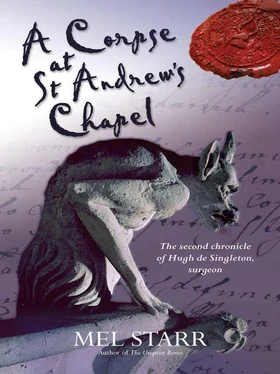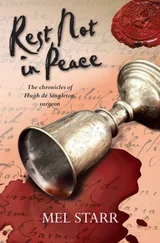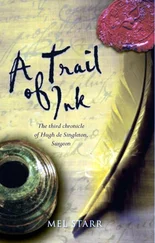Mel Starr - A Corpse at St Andrew's Chapel
Здесь есть возможность читать онлайн «Mel Starr - A Corpse at St Andrew's Chapel» весь текст электронной книги совершенно бесплатно (целиком полную версию без сокращений). В некоторых случаях можно слушать аудио, скачать через торрент в формате fb2 и присутствует краткое содержание. Год выпуска: 2010, Издательство: Kregel Publications, Жанр: Исторический детектив, на английском языке. Описание произведения, (предисловие) а так же отзывы посетителей доступны на портале библиотеки ЛибКат.
- Название:A Corpse at St Andrew's Chapel
- Автор:
- Издательство:Kregel Publications
- Жанр:
- Год:2010
- ISBN:нет данных
- Рейтинг книги:5 / 5. Голосов: 1
-
Избранное:Добавить в избранное
- Отзывы:
-
Ваша оценка:
- 100
- 1
- 2
- 3
- 4
- 5
A Corpse at St Andrew's Chapel: краткое содержание, описание и аннотация
Предлагаем к чтению аннотацию, описание, краткое содержание или предисловие (зависит от того, что написал сам автор книги «A Corpse at St Andrew's Chapel»). Если вы не нашли необходимую информацию о книге — напишите в комментариях, мы постараемся отыскать её.
A Corpse at St Andrew's Chapel — читать онлайн бесплатно полную книгу (весь текст) целиком
Ниже представлен текст книги, разбитый по страницам. Система сохранения места последней прочитанной страницы, позволяет с удобством читать онлайн бесплатно книгу «A Corpse at St Andrew's Chapel», без необходимости каждый раз заново искать на чём Вы остановились. Поставьте закладку, и сможете в любой момент перейти на страницу, на которой закончили чтение.
Интервал:
Закладка:
“Perhaps,” I agreed. Actually, I did not agree. But having no better theory myself, I saw no reason to challenge the point. Certainly there is now, since plague has struck twice, in England much wasteland, where wolves could live and travel unmolested. But would a wolf make his presence in the shire first known by an attack on a man? I have heard tales of wolves, that they travel in packs and are seldom solitary. And they howl. Wolves are not silent creatures. It seemed to me a wolf would announce his presence with the taking of a sheep, or perhaps a pig rooting for last autumn’s acorns in the forest.
“I must return to Bampton. The miller awaits, with a broken arm. But before I go, there is also the matter of the missing shoes. Should you see a man wearing good shoes when he has owned recently only poor ones, send for me. This,” I held out the blue yarn, “was found at the scene of Alan’s death. Does anyone hereabouts wear a garment of this hue?”
Kellet stared at the strand and, I thought, seemed ill at ease. He shifted from one foot to another before he made answer.
“Wold is grown in most every toft,” he commented. “’Twould make a color much like this. But no, I know of no one of this parish who owns a cotehardie or surcoat of this pale blue.”
“Should you see such a garment, call for me at the castle.”
“I will…I will, indeed. And I’ll keep me eye peeled for shoes, as well.”
I thanked him for this, and set off for the town and the injured miller.
The miller had not moved from his bench. I found him sagging against a beam, his eyes gratifyingly heavy. The hemp and willow had done their work. Although the bruise made by the wheel was now growing fiercely purple, the break in Andrew’s forearm was clean and simple to treat. I took several thin canes I had cut along Shill Brook and bound them tightly about the forearm when I was satisfied that it was straight. I directed the miller’s wife to bring a bowl of water from the pond. Into this I poured a pouch of quicklime. All that remained was to soak linen strips in the plaster and wind these about the canes and the miller’s arm until it was well encased. I continued the stiffened linen past the miller’s elbow, to provide as much support as possible for the business of putting his shoulder right.
While the plaster dried and hardened I explored the shoulder with my fingers to see how badly out of joint it was. I felt the ball of the miller’s upper arm, and pressed firmly through his fleshy shoulder to find the empty socket. When I had found both ball and socket I manipulated the arm gently to see what work I had before me to put these parts together. I was shocked when I heard a muffled “click” and felt the arm spring back to its place under my touch.
Andrew twitched and yelped in a brief moment of pain, then relaxed as I dropped my hands and stepped back.
“Ah…you warned me. I shall try not to jerk about so as you work. How…how long will you be at putting my shoulder right?”
“I am done,” I replied, with rather more pride than was meet.
“Done?” The miller’s eyes widened. He moved his shoulder experimentally. “But I thought…you warned me of great pain. ’Twas but a prick. The potion, it must have been strong, indeed.”
“Indeed,” I agreed.
The miller stretched his shoulder again. “’Tis a wondrous thing, how with but a shift of your fingers you set me right.”
I did not tell Andrew that I was as amazed as he at the ease with which his shoulder was made whole. If he chooses to believe my skill extraordinary and tells his customers — and that would be all who live on Lord Gilbert’s lands, villein or free — that Master Hugh is gifted at his work, must I be distressed?
I told the miller that I would call on him in a few days to see how he got on, and that before St Swithin’s Day I would remove the stiffened linen and splints.
The miller was known as a parsimonious man. He was known also, like most of his trade, for defrauding on return of flour if he could do so without detection. He asked my fee. I expected an argument, but he paid without rancor. He fished six pence from a small chest which stood on a dusty table under the single dusty window which lighted the dusty mill.
The evening sun was well down in the west when I left the mill and turned toward Mill Street. I was just in time to see John Kellet waddle across the bridge over Shill Brook. The priest’s tunic billowed before his belly like a sail full of wind. Immediately across the bridge, he turned and took the path to the cottages in the Weald. Something to do with one of the bishop’s tenants, I assumed, and made my way to the castle.
I had made no progress in finding Alan’s missing shoes. This vexed me, but no matter how I considered the situation, I could see no path leading to their discovery. Unless someone reported new footgear on another, Matilda was not likely to get her husband’s shoes back.
Next day was Good Friday, beginning the commemoration of our Lord’s death and resurrection. I decided on a bath, both to clean myself for the holy days and, while I soaked, to devise some way I might track the missing shoes.
The kitchen was busy preparing supper, but not too busy. Lord Gilbert was in residence at Pembroke Castle, keeping the peace in Wales. So the evening meal would be simple. I told the cook that I required six buckets of hot water, delivered to my chamber after the meal.
For supper this day there was parsley bread, a pea soup, and cabbage with marrow. This was not a meal which would have satisfied Lord Gilbert Talbot, who at Pembroke at this hour would likely be dining on such as venison and salmon, and enjoying a subtlety with each remove. But compared to the fare at the Stag and Hounds, on the High Street in Oxford, where I dined until Lord Gilbert brought me to Bampton, this repast was a feast.
When the simple meal was done I returned to my chamber — which did not take long, as the room opened on to the great hall. I busied myself with knives, scalpels and sharpening stone from my implements box until a light rapping sounded on my door. I opened it to see the child Alice atte Bridge standing before me, a bucket in each hand. “Hot water, sir,” she smiled, and curtsied.
As she did so some of the water slopped out of the buckets to the flagging. Two buckets full of water were a significant weight for her slender shoulders. “Sorry, sir. I’ll bring somethin’ t’mop it up.”
“Never mind. It’ll dry. Just pour the water in the barrel and fetch four more buckets.”
Alice dumped the water, glanced briefly at my instruments where I had spread them on my table, then scurried off for more. A year and a half had passed since I first met the girl. She had come to me seeking help for her father. He had slipped on icy cobbles and broken a hip. I could do nothing for him but administer potions which would relieve his pain and ease him to the next world.
The child had two half-brothers who would have despoiled her of anything she possessed from her father, could they have done so. But at her father’s death I advised her to remove all goods from the hut she shared with her father and take them to the castle. She was put to work in the scullery. Apparently this labor agreed with her. She was no longer the scrawny waif I had aided. She was taller, and no longer looked to be constructed of splinters and coppiced beech poles. I noted as she brought the next buckets that there were now pleasing bulges under her plain cotehardie. These curves were set off remarkably well by the simple belt she wore about her waist, a part of her which remained gratifyingly slender.
When she had delivered the last of the hot water and had curtsied her way out — no one having told her that she need not curtsy to a mere bailiff — I bolted the door, stripped off my clothing, and submerged so much of myself as was possible into the cask. This cask the carpenter had sawn in half for me.
Читать дальшеИнтервал:
Закладка:
Похожие книги на «A Corpse at St Andrew's Chapel»
Представляем Вашему вниманию похожие книги на «A Corpse at St Andrew's Chapel» списком для выбора. Мы отобрали схожую по названию и смыслу литературу в надежде предоставить читателям больше вариантов отыскать новые, интересные, ещё непрочитанные произведения.
Обсуждение, отзывы о книге «A Corpse at St Andrew's Chapel» и просто собственные мнения читателей. Оставьте ваши комментарии, напишите, что Вы думаете о произведении, его смысле или главных героях. Укажите что конкретно понравилось, а что нет, и почему Вы так считаете.












